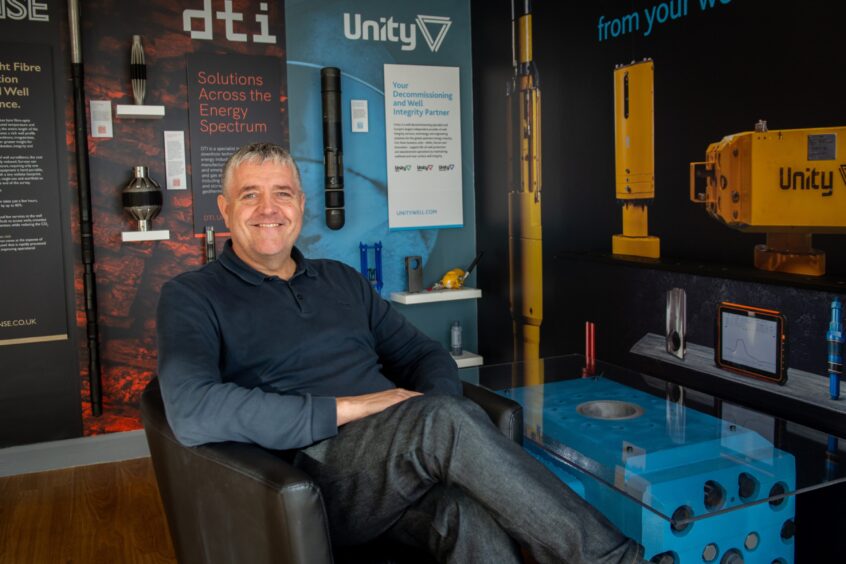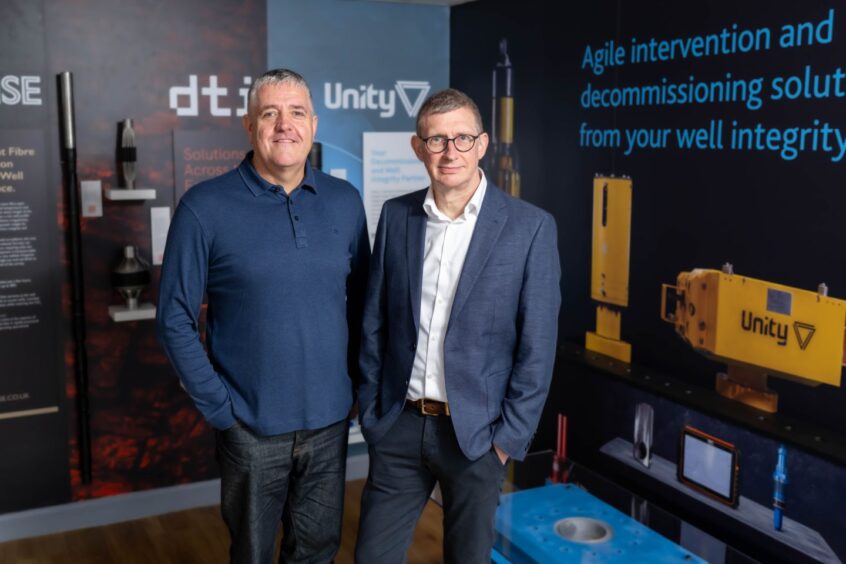
Decommissioning of North Sea wells and infrastructure is happening – but perhaps more slowly than the supply chain supporting the activity had hoped.
For Steve Kent, the new chief executive of technology firm FrontRow Energy Technology Group, delays to the big projects on the horizon are “frustrating” but there is work to be getting on with.
One of the Dyce-based firm’s portfolio company that is strongly aimed at this market is called Unity.
Its innovative Surface Intervention System (SIS) has been in development for the last four years. The industry’s first ultra-compact light well intervention system, SIS is now winning customers in the North Sea. SIS can deliver operational efficiencies, a reduced carbon footprint, and cost savings of up to 75% for single deployments. It also minimizes environmental footprint by decreasing the need for large vessels and heavy equipment at well sites.
“By providing what we call light well intervention technology, we are bridging the gap between well intervention and plug and abandonment (P&A) work,” he says.
“Some of the technologies we’ve developed are very relevant for well intervention and will also be used on decom. We are protecting ourselves as a business, because if you invest only in decom, you might be waiting a while.
“We see the market coming at us, and we are doing decom work. But there’s also a lot of postponement of well programs.”
Nevertheless, Unity has successfully conducted abandonment work for multiple operators on over 240 wells, with another 100+ planned.
Operators often face unforeseen challenges when embarking on decommissioning projects, particularly with older wells where conditions can be unpredictable. With the market driven by the urgent need for operators to manage aging wells, Kent is optimistic. “Operators are compelled to perform decom work, and the problem with very old wells is that operators don’t necessarily know what they’re getting into before they get into it.
“Our focus is on developing technology that reduces costs and enhances efficiency.”
Another business, Well-SENSE, has developed fibre optic sensing technology which is “well suited to abandonment work”, says Kent..
FibreLine Intervention (FLI) which provides leak detection and a “health check” of the well verifies the integrity of plugs and other pressure barriers before the well is finally abandoned.
“But the most value from FLI is realised through optimisation of the abandonment activities themselves,” says Kent. “It helps to reduce the time, cost and risk of well abandonments.”
FrontRow was established in 2017 by Graeme Coutts, a veteran of the energy sector and former CEO of Expro Group who brought on board Stuart Ferguson, previously a chief technology officer at Weatherford, as managing director.
He has now up the role of executive chairman role alongside Kent in the CEO role, while Coutts remains an executive director of FrontRow.
Kent has known Ferguson for over 25 years since they both began working together at Petroline and again at Weatherford.
After co-founding EPI-V, an energy services investment firm, Kent took the helm as executive chairman of Deep Casing Tools, leading it to its acquisition by Drilling Tools International (NASDAQ: DTI) in March of this year. The deal marked an exit for the firm’s largest shareholder, EV Private Equity. Under his stewardship, Deep Casing Tools garnered accolades, including recognition as one of the fastest-growing UK technology firms in the Deloitte Fast Fifty Awards for 2023.
Kent envisions a more commercially driven approach for FrontRow. Other companies in the group include ClearWELL, DTI and Well-SENSE offering a range of downhole and flowline technologies across oil and gas, gas and hydrogen storage, CCS and geothermal.
“FrontRow has been around for a number of years now, and it’s been very focused on technology development and early-stage technology commercialisation,” he said.
“One of the things that struck me about FrontRow was that it has got some fantastic technologies, which have been brought about through that entrepreneurial spirit that we find in Aberdeen. But some of them are really well-kept secrets and they shouldn’t be.
“We need to get them out into the market. We need to get people to understand what they do and what they are and how valuable they can be.
“And we want to keep that conveyor belt going.”
With a commitment to growth, FrontRow is actively seeking investment opportunities, whether through attracting new investors, or finding inventors and other small firms in which they can make capital injections or strategic acquisitions that align with its mission.
FrontRow is currently backed by its management team and raised over £20million from the government-backed Business Growth Fund (BGF) in its early years.
The firm has enjoyed a 400% increase in revenues since 2017 and significant EBITDA growth.
In the year to end of 2023, the firm made revenues of £26.9 million, but pre-tax losses stretched to £3.8m. Looking towards 2025, the directors said they were confident all group companies would be profitable.
Kent is also confident that the formula is working.
He added: “FrontRow is open for business. I’d love nothing more than 100 entrepreneurs come knocking on the door tomorrow looking for funding.”
Kent envisions a more commercially driven approach for Front Row. “We have been very focused on technology development, we now need to be more commercially focused,” he asserts.
He highlights the need for clarity in the decom market, suggesting that collaboration among all stakeholders—including regulators and operators—is crucial for driving progress.
“Removing old infrastructure is a collective responsibility,” Kent emphasises. “If we can create clarity around the decommissioning journey, it would be beneficial for everyone involved.”
Despite the North Sea’s challenges, he believes that the region can serve as a launching pad for international expansion, leveraging its rich history of innovation and expertise in energy technologies.
“The UK has been such a home for technical innovation. I think any business that positions itself in the right place in the UK will then be able to enjoy international business, like in the Gulf and Mexico and there’s a lot of lot of wells in Europe. You think about Norway and Holland decommissioning now, a lot of wells in Asia Pac and, of course, the Middle East will follow.
“For the UK it’s a fantastic opportunity to be a global leader in that business. But we need certain things to happen.
“We need clarity on the decom journey. There’s no one answer. The answer is going to come from collaboration between all stakeholders and, agreement between all stakeholders to push the whole thing forward.”
Recommended for you


 © SYSTEM
© SYSTEM © Supplied by FrontRow
© Supplied by FrontRow